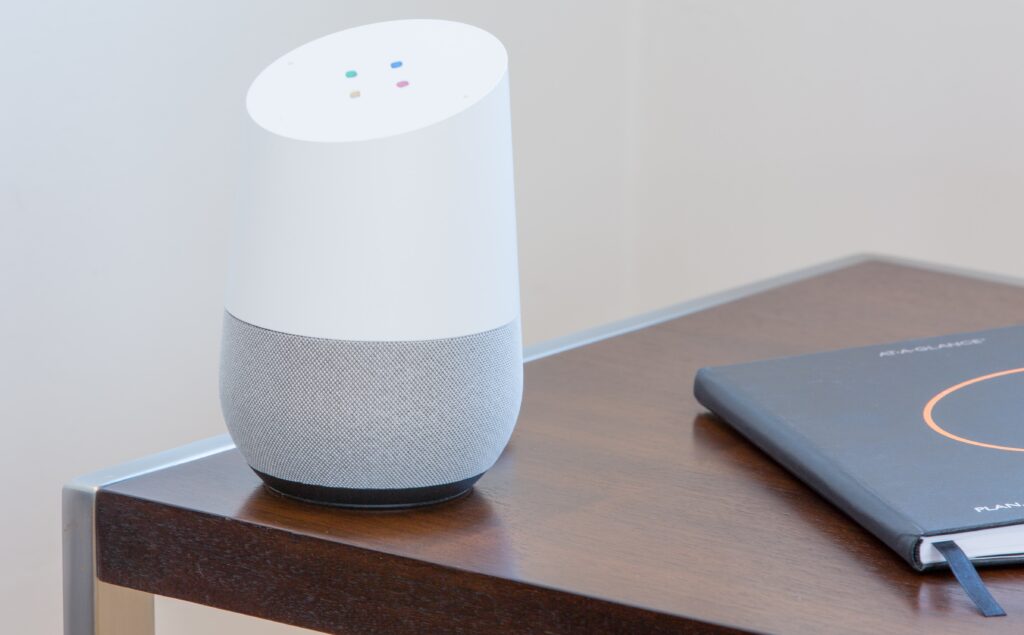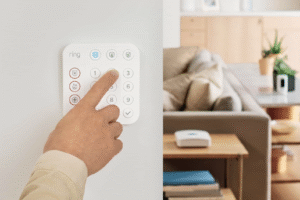“Hey Siri, what’s the weather going to be like today?”
“Hey Alexa, can you play that one song that goes doo-doo-duh-doo?”
“Okay, Google. Tell me a joke!”
Voice assistant technology has revolutionized the way we work and play. Whether we want to know if we’re going to need a sweater, need to listen to that song that’s stuck in our head, or just want to talk to someone when no one else is around, voice recognition technology seems to always have the perfect answer.

Table of Contents
A Quick Timeline of Voice Assistant History
Shocking as it might seem, voice assistant tech isn’t necessarily new… in fact, it’s been under development for over a century! And it’s definitely come a long way since those staticky first listening and recording devices were in use.
1952: A group from Bell Laboratories built the very first voice assistant to enable hands-free dialing. It was named “Audrey”, and the technology could recognize digits from zero to nine, but there was definitely limited capability.
1962: IBM engineer showcased Shoebox, a voice-activated calculator that could identify ten digital and a few control words, spoken through a microphone.
1976: Researchers at Carnegie Mellon University developed Harpy, who had a vocabulary of 1011 words and could understand full sentences and the boundaries of words.
1986: An updated version of Shoebox was introduced, and named after the fastest typist in the world, Albert Tangora. Tangora had an improved memory capacity and could retain up to 20,000 words.
1997: Dragon NaturallySpeaking was introduced and was able to recognize and transcribe natural speech…but for a price. It originally cost $695!
2010s: IBM’s Watson competed with some of the best on the popular television game show Jeopardy, and defeated each in total points. Just a few months after Watson’s success, conversational voice assistants like Siri, Google Assistant, Microsoft’s Cortana, and Alexa were introduced to the market and quickly became an active member of the family in people’s homes.
Now, let’s uncover what AI-powered voice assistant technology is exactly — and see how it’s actually revolutionizing the way we work and live.
What is Voice Assistant Technology?
A voice assistant, also often referred to as an intelligent virtual assistant or an AI digital assistant, leverages artificial intelligence and voice recognition technology to respond to human queries in real time. Thanks to this smart technology, the voice assistant is able to synthesize the user’s initial message, break it down and evaluate its request, and then offer a meaningful and timely response in return.
There are typically two types of AI-voice assistant technology: general-purpose and chatbot voice assistants.
General Purpose Intelligent Virtual Assistants Versus Voice Chatbot Assistants
You may be familiar with Amazon’s Alexa, Apple’s Siri, or Google Assistant — each of these virtual assistants fit under the general purpose category. You’ll likely find these programs automatically integrated into your smartphone or as a separate smart device.
Voice chatbot assistants are integrated into an application or a website, and act as around-the-clock, 24/7 virtual assistants to help new and existing visitors navigate their surroundings. An intelligent chatbot assistant will be able to translate questions in real-time easily and accurately and allow your website or app to optimally function, even when your team isn’t physically around to handle inquiries.
There are a lot of benefits to voice recognition technology — for both your home environment and your business as a whole! Here are just a few to consider.
1. Increased Productivity in Your Working and Living Environment
There’s a reason why it’s estimated that consumers will use voice assistants on more than 8 billion devices by the year 2024. Regardless of how you’re using your intelligent voice assistant, there’s no denying that they make life that much easier, all through spoken word. Now that you’ve freed up your hands thanks to voice recognition technology, think of all the other things you could be doing instead!
2. Time Saver for Automated Tasks
Who isn’t ready to automate a few more tasks in their lives? Whether it’s asking Siri to set a reminder to call your mom for her birthday or send a time-sensitive email to a colleague, voice assistants save you the extra time and effort it takes to set up these processes manually and keep you on track throughout the day.
3. Improved Cybersecurity Measures
One of the more important benefits of voice technology is the increase in cybersecurity measures, particularly for businesses. By implementing accurate voice recognition based on factors such as tone, pitch, pacing, and fluctuations in sound, everyone’s unique voice can be identified to protect customer or business assets and important information.
4. Accommodates Hand-Free Operations Around the Home and Office
AI-voice assistants are also helping to accommodate new accessibility measures for individuals with reduced physical and mental capabilities around the home and office. When integrated with other smart home automation technology such as lighting, energy, or security systems, your AI voice assistant can help to turn on lights, lower or raise temperatures, and alert you to new visitors via voice control.
5. Can Provide 24/7 Support for Clients and Customers
Intelligent virtual assistants such as chatbots are a great support tool to implement for your business because it will allow you to offer 24/7 support for clients and customers without overextending your team or yourself! Let these virtual chatbots interface with customers to get basic questions answered and offer new solutions for them to get in contact with you directly during business hours.
How Eco Smart Home Pros Can Help
With more than thirty years of experience in programming and technology, Eco Smart Home Pros believe that technology can be the answer to helping you live a happier, healthier, and more sustainable life. Our dedicated team of smart home installation professionals can help you develop a solution that’s optimized for your lifestyle, meeting all of your tech needs both at home and in the workplace. Learn more.
Frequently Asked Questions
What are voice technologies?
Voice technology (also referred to as speaker recognition) is a type of voice recognition technology that allows a computer to recognize and decode the human voice. This ability allows machines or programs to receive and interpret spoken word and carry out commands based on that information. It’s widely used with AI-powered voice assistants such as Amazon’s Alexa, Microsoft’s Cortana, and Apple’s Siri.
What are the benefits of voice technology?
There are a lot of benefits to integrating voice technology into your home or business. This includes:
- Increased productivity, particularly in situations where it’s important to capture speech faster than one can type.
- Additional accessibility for those with physical or mental handicaps.
- Enhanced convenience for users.
In the end, the primary benefit for voice technology is centered around new levels of productivity and convenience for those who use it in their homes and workplaces.
How do intelligent virtual assistants work?
An intelligent virtual assistant processes the words a user speaks or types into a machine in order to convert it into digital data that software can then analyze. This software uses state-of-the-art speech recognition technology via an algorithm to find the best answer to return to the user.
What are the top benefits of intelligent virtual assistants?
Much like voice technology, an intelligent virtual assistant is instrumental in improving overall productivity and helping its user to automate once-manual tasks such as transcription, note-taking, etc. It is also instrumental in setting automatic reminders and other helpful prompts in one’s smartphone or smart device.


